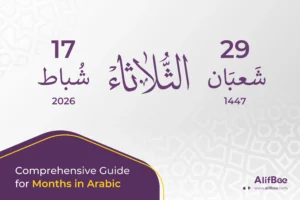Why are Arabic Quotes about Life Important?
In every culture, proverbs and sayings are not only beautiful words that enrich our language and add to our daily conversations. We learn from them valuable lessons about life like patience, justice, friendship, hard work and positivity, guiding us in key moments in life.
In this post, we’ve gathered 10 of the most beautiful Arabic quotes that offer timeless life lessons. Each one shows how the Arabic language expresses complex emotions and thoughts in clear, thoughtful ways. Whether you’re here to learn Arabic, explore Arabic culture, or just enjoy some beautiful Arabic words, these proverbs will give you a fresh and inspiring look into how Arabic speakers see the world.
Quote 1
English
Transliteration
Arabic
Patience is the key to relief.
aṣ-ṣabru miftāḥu al-faraji
الصَّبرُ مِفتاحُ الفَرَجِ
Let’s start with a lesson about patience that is always true. This common Arabic proverb reminds us that no matter how hard life feels during hardships, patience is “the key” or the secret that will eventually bring better days.
But that does not mean we should do nothing in the face of difficulties. On the contrary, we should hold on with hope, strongly believing that struggles don’t last forever. It is a beautiful Arabic proverb that teaches us not to despair and to stay strong and hopeful of a relief to what we are going through.
Quote 2
English
Transliteration
Arabic
What goes around, comes around
kamā tudīnu tudānu
كَما تُدِينُ تُدانُ
This a common Arabic proverb about life “كَمَا تُدِينُ تُدَانُ” (kamā tudīnu tudān), which translates roughly to “As you judge, so shall you be judged” or “What goes around comes around.”
This phrase expresses the principle of reciprocity and justice: the way you treat others will eventually come back to you, whether good or bad. It’s a moral warning that your actions—especially those involving judgment, treatment of others, or wrongdoing—will be returned to you in kind.
Quote 3
English
Transliteration
Arabic
Don't put off today's work for tomorrow
lā tuʾajjil ʿamala al-yawmi ilā al-ghadi
لَا تُؤَجِّلْ عَمَلَ اليَومِ إلى الغَدِ
This proverb encourages taking action without delay and warns against procrastination. It reflects the value of time management, responsibility, and productivity in Arabic and Islamic cultures. It implies that delaying tasks can lead to missed opportunities, increased stress, or poor results due to rushing later.
This saying mirrors a common value in both classical Arabic wisdom and modern advice on success and discipline. It’s especially popular in parenting, education, and workplace contexts, much like the English equivalent “Never put off until tomorrow what you can do today.”
It’s often used to motivate someone to act now rather than delay, advise students or workers to stay on schedule, remind yourself to be proactive and responsible.
Quote 4
English
Transliteration
Arabic
Actions speak louder than words.
al-afʿālu ablaghu mina al-aqwāli
الأفعالُ أبلَغُ مِنَ الأقوالِ
This is another common Arabic proverb highlighting the idea that what people do matters more than what they say. It literally translates to “Actions are more eloquent than words.” It promotes integrity, sincerity, and accountability, emphasizing that people’s real intentions are revealed through their behavior, not their speech.
In Arabic and Islamic tradition, sincerity in actions (صدق العمل) is highly praised. The proverb teaches that talk is cheap, which is a principle echoed across cultures. You can use this proverb to remind someone that promises mean nothing without follow-through, to encourage leading by example, or to criticize hypocrisy or empty talk.
Quote 5
English
Transliteration
Arabic
Time is gold.
al-waqtu min dhahabin
الوَقتُ مِن ذَهَبٍ
This proverb emphasizes the incredible value of time, making it equal to gold, which is a symbol of wealth and rarity. It teaches that if we lose time, it is impossible to regain it, so we should use it wisely, efficiently, and purposefully. This proverb is used by parents, teachers and business owners to stress the importance of time management and is often cited to encourage not procrastinating.
Quote 6
English
Transliteration
Arabic
Not all that glitters is gold.
laysa kullu mā yalmaʿu dhahaban
لَيسَ كُلُّ ما يَلمَعُ ذَهَبًا
This is another common Arabic proverb that warns against being deceived by appearances. Something that looks attractive, valuable, or trustworthy at first look may not have true worth or hide flaws beneath the surface.
This wise proverb reflects a universal truth that we must look beyond appearances to understand the real value of things or people. It works with relationships, material possessions, opportunities, and claims and promises.
Use it to advise others to be careful when something looks too good to be true or to warn against superficial judgments.
Quote 7
English
Transliteration
Arabic
Whoever seeks success stays up at night.
man ṭalaba al-ʿulā sahira al-layāl
مَن طَلَبَ العُلا سَهِرَ اللَّيالِي
This saying highlights the idea that true success requires effort, sacrifice, and persistence. It literally means “Whoever seeks high status stays up the nights.” It suggests that achieving greatness requires hard work and long hours of dedication, often at the expense of comfort or sleep.
It reflects a universal truth: meaningful achievement doesn’t come easily. Across cultures, success is associated with discipline, late-night study, and going the extra mile—especially when others are resting.
You can use it to motivate your students, children or anyone following success in life. It reminds us that ambition must be paired with commitment and that real results require consistent effort over time.
Quote 8
English
Transliteration
Arabic
A friend in need is a friend indeed.
aṣ-ṣadīqu waqta aḍ-ḍīqi
الصَّدِيقُ وَقتَ الضِّيقِ
This saying highlights the true test of friendship: how someone behaves when you’re struggling. Its literal translation is “The friend (is known) at the time of distress.” In other words, a real friend is not just present in moments of joy but stands by you during your hardest times. They offer us support, empathy, or help when we need it most.
It’s a commonly used proverb that reflects a universal truth about loyalty and compassion and how they reveal the genuine nature of a relationship in difficult moments. It applies to personal friendships, family bonds, and even professional alliances.
Use it to praise someone who stood by you during hardship, or to remind others that friendship is more than words—it’s proven through action when life gets tough.
Quote 9
English
Transliteration
Arabic
Those who constantly watch others are consumed by worry
man rāqaba an-nāsa māta hammā
مَن راقَبَ النَّاسَ ماتَ هَمًّا
This Arabic proverb reminds us that constantly focusing on other people’s lives can quietly drain our happiness. It can be translated to “Whoever watches people dies from worry.” In other words, when you keep checking what others are doing, how they’re living, or what they’ve achieved, you end up feeling anxious and unsettled.
It touches on something many of us feel without saying. The more you compare yourself to others, the more you lose sight of your own journey. True peace comes when you turn your attention inward and focus on your own goals and growth.
Use this saying to encourage a shift in mindset. Let it be a soft push to stop worrying about how your life measures up to someone else’s and to start appreciating where you are and where you’re headed.
Quote 10
English
Transliteration
Arabic
Stay positive, and good things will happen
tafāʾalū bil-khayri tajidūhu
تَفاءَلوا بِالخَيرِ تَجِدُوهُ
These beautiful Arabic words translate to “Be optimistic about good, and you will find it.” This proverb encourages us to keep a hopeful outlook, even when things feel uncertain. When you expect good, you’re more likely to find it because positivity shapes how you see the world and how you respond to it.
It reflects a timeless truth that your mindset matters. People who focus on the good are more likely to notice opportunities, attract support, and bounce back more easily from setbacks. However, optimism here doesn’t mean ignoring your problems; it means you believe you can overcome them.
You can use this proverb to uplift someone going through a tough time, or as a daily reminder to choose hope over fear. A positive mindset can open doors you didn’t even know existed.
Final word
From the importance of hard work to the value of true friendship, these Arabic sayings about life remind us of the wisdom passed down through generations. They are short, memorable, and full of meaning, perfect examples of the richness of the Arabic language.
If you’re trying to learn Arabic or simply appreciate Arabic culture, reflecting on these proverbs is a great way to connect with the language in a deeper, more personal way. We hope these beautiful Arabic words not only inspire you, but also bring you closer to the heart of Arabic-speaking communities.
If you liked these proverbs, read more of our articles on Arabic proverbs and sayings:
– 10 Wise Arabic Sayings with Meaningful Comparisons
– 28 Beautiful Arabic Quotes for Every Letter in Arabic
– 6 Captivating Arabic Proverbs about Love
To take the next step in your Arabic journey, download the AlifBee App—a fun and effective way to learn Arabic at your own pace. And don’t forget to grab your free 30-day learning plan worksheet, packed with daily activities and vocabulary to build your skills day by day.
Start today. A world of beautiful Arabic words and meaningful learning awaits.
If these Arabic quotes spoke to your heart, take the next step and learn the language that carries them — with AlifBee’s 14-day free trial.









